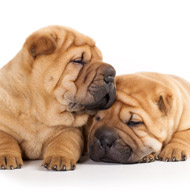
Uptake for new scheme proves popular at health day
A new official DNA testing scheme for primary open angle glaucoma/primary lens luxation (POAG/PLL) in the shar-pei has been approved by the Kennel Club.
In February, the Kennel Club - together with breed clubs - held a sharp-pei health day at the Animal Health Trust (AHT) in Newmarket.
Thrilled with the uptake for the scheme, Cathryn Mellersh, head of canine genetics at the AHT, said that more than 40 dogs were swabbed for DNA tests on the day.
“The frequency of the mutation was very high among these dogs,” she explained. “This means that is is vitally important that carriers continue to be used for breeding at least for the next few generations.”
She added that not using carriers could lead to an unacceptable reduction in the genetic diversity of the breed.
“POAG is recessive in the shar-pei, so carriers can be safely bred to clear dogs without the risk of producing clinically affected offspring,” she continued. “ Although any puppies that might be used for breeding should themselves be tested prior to breeding.”
The Kennel Club constantly reviews DNA testing schemes in conjunction with breed clubs to ensure that breeders are supported with resources to help them make responsible breeding decisions.
The DNA testing scheme for the shar-pei was approved following consultation with the breed’s health co-ordinator on behalf of the breed clubs.



 The Veterinary Medicines Directorate (VMD) is inviting applications from veterinary students to attend a one-week extramural studies (EMS) placement in July 2026.
The Veterinary Medicines Directorate (VMD) is inviting applications from veterinary students to attend a one-week extramural studies (EMS) placement in July 2026.